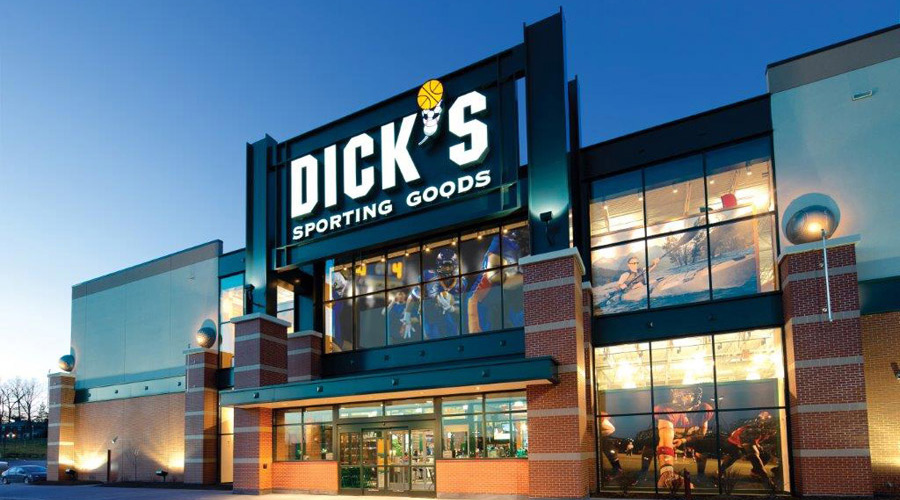By Charlie Lunan
Faster-than-expected liquidation of inventory at hundreds of Sports Authority stores was more of a windfall than a head wind for Dick’s Sporting Goods Inc. (DKS) in the quarter ended July 30.
The nation’s largest sporting goods retailer reported traffic at the flagship Dick’s Sporting Goods chain grew 1.7 percent in the second fiscal quarter compared with a year earlier, while average ticket rose 1.3 percent. That enabled the chain to grow same-store sales 3.0 percent and enabled DKS to grow consolidated same-store sales 2.8 percent, compared with the 4.0-to-1.0 percent decline the company forecast in May. Comp stores, which include e-commerce sales, sales fell 4.3 percent at Golf Galaxy.
DKS net income reached $91.4 million, or 82 cents per diluted share in the fiscal second quarter, up from 77 cents a year earlier. The results far exceeded the 62 to 72 cents the company forecast three months ago when many of its competitors lowered their guidance in anticipation of going-out-of-business sales at more than 500 Sports Authority (TSA) and Sport Chalet stores.
Investors cheered the upside, sending Dick’s shares up nearly 10 percent to nearly $60 per share and a new 52-week high within hours of the earnings release. DKS share price was trading at about $57.75 by midday Wednesday.
“Our guidance assumed substantial headwinds from the TSA and Sport Chalet liquidations, which we expected to continue into the third quarter,” explained Chairman and CEO Ed Stack. “As many of you know, these were completed sooner than anticipated. As you can imagine, over the first several weeks all the good stuff got cherry-picked pretty good and they got left with the dregs.”
Camping, Licensed and E-Commerce Sales Drive Comps
As Sports Authority stores sold through their inventory, customers turned to nearby Dick’s locations to fulfill their needs, particularly for camping, water sports and paddle sports gear.
“That business has really been very good,” said Stack.
Same-store sales growth was driven primarily by e-commerce sales, which grew 26 percent to reached 8.5 percent of net sales, but also offset improved merchandize margins and occupancy costs and resulted in flat gross margin of 30.4 percent. The company ended the quarter with 649 Dick’s Sporting Goods stores, 72 Golf Galaxy stores and 21 Field & Stream stores for a net increase of just one store compared with a year earlier.
DKS also saw strong growth at its license business, which benefited from the Pittsburgh Penguins and Cleveland Cavalier championships. While golf comps were down, margins on those sales improved for a fifth consecutive quarter.
DKS’ consolidated net sales grew 7.9 percent to approximately $2.0 billion, while inventory levels were up just 6.2 percent by quarter’s end, including the impact of cold-weather merchandise being held for the 2016 winter season.
Time To Grab Market Share
DKS expects to open approximately 25 new Dick’s stores, seven new Field & Stream stores and two new Golf Galaxy stores in the current quarter. Fifteen of the new Dick’s stores will open in new markets, including Houston, where the company plans to open six locations.
Some openings will take place at former Sports Authority stores thanks to leases DKS acquired at its rival’s bankruptcy auction. However, DKS, which is focused on growing its digital business this year and next, has already rejected a few of the 31 leases it acquired.
“There’s a few that we know that we’re not going to open up because we couldn’t make the right deal,” Stack said of the locations, 20 of which are in California and Florida where DKS has less penetration. “And we’ve walked away from them.”
Regardless, Stack said the closing of more than 500 Sports Authority and Sport Chalet stores will provide a tailwind for years, starting with a less promotional retail environment in the upcoming fourth quarter. He sees opportunities to earn a significant piece of Sports Authority’s fitness, footwear, apparel, team sports and tennis business, although the last is too small to significantly affect the company’s top line.
“What we’ve learned is that they did a bigger fitness business than we had anticipated,” said Stack. “Whether it’s cardio, other fitness products, we think we’ve got an opportunity in fitness to grab significant market share.”
DKS is looking to its expanded footwear offering for growth during the back-to-school and holiday seasons. The retailer has expanded its offering of premium footwear in 117 stores and plans to roll out the assortment to 70 more before the holidays. The retailer has also elevated footwear online with a sharp focus on private labels such as Calia, Field & Stream, Quest, Adidas Baseball, Umbro Soccer, Top Flite and Max Flight.
Stack conceded Under Armour’s decision to begin selling through Kohl’s could slow growth.
“We wish it wasn’t happening but we don’t think it’s really a big impact,” Stack said.
Upping Guidance
DKS upped its guidance, which now calls for earnings to reach $2.90 to $3.05 per fully diluted share and comp store sales to grow 2 to 3 percent in fiscal 2016. It had previously forecast earnings of $2.60 to $2.90 and a -0.2 percent decline in same-store sales. Earnings will hinge in part on how much it costs to convert Sport Authority stores to the Dick’s format.
Stack said there is still uncertainty about how much business Sports Authority liquidation sales pulled forward, particularly in some of the important back-to-school categories such as footwear and apparel, which make up a big chunk of DKS’ fiscal third quarter sales.
“We believe we are poised to pick up long-term market share, but remain a bit conservative until we get more distance from the liquidation event, which removed approximately $400 million of inventory from the market in a very short period of time,” he said.
Lead photo courtesy Dick’s Sporting Goods
















